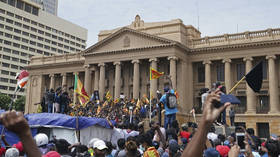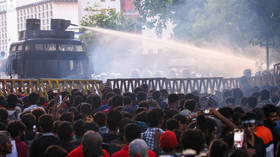Sri Lankan PM to step down amid economic meltdown

Sri Lankan Prime Minister Ranil Wickremesinghe told party leaders on Saturday that he is willing to step down and allow a new government to be formed. His decision came after President Gotabaya Rajapaksa fled his residence before a mob of protesters stormed the building.
Wickremesinghe’s office announced the news in a statement, around two hours after the PM sat down with political leaders to seek a resolution to the political crisis gripping the South Asian nation. With Wickremesinghe out of power, the speaker of parliament will likely become acting prime minister until elections are held.
Wickremesinghe’s term in office was a short one, beginning in mid-May when he replaced Mahinda Rajapaksa, brother of current President Gotabaya Rajapaksa. The president has not yet resigned, despite a horde of protesters storming his residence in Colombo earlier on Saturday.
Several lawmakers have demanded the resignation of Rajapaska, whose whereabouts are currently unknown.
Sri Lanka has been in a state of unrest for several months, with food and fuel in short supply and prices skyrocketing. The country defaulted on its foreign debt in May for the first time in its history. Fuel rationing was introduced earlier this month, and armed police and troops have become a common sight at Sri Lankan petrol stations.
Sri Lanka’s financial crisis can be partly attributed to the Covid-19 pandemic, which saw the island nation losing vital tourism revenue. High government spending and tax cuts then depleted state coffers, and the state’s attempts to pay off foreign bonds by increasing money-printing led to soaring inflation.
Shortly after Wickremesinghe announced his willingness to resign, protests outside his house continued, with riot police reportedly seen using tear gas on demonstrators.













